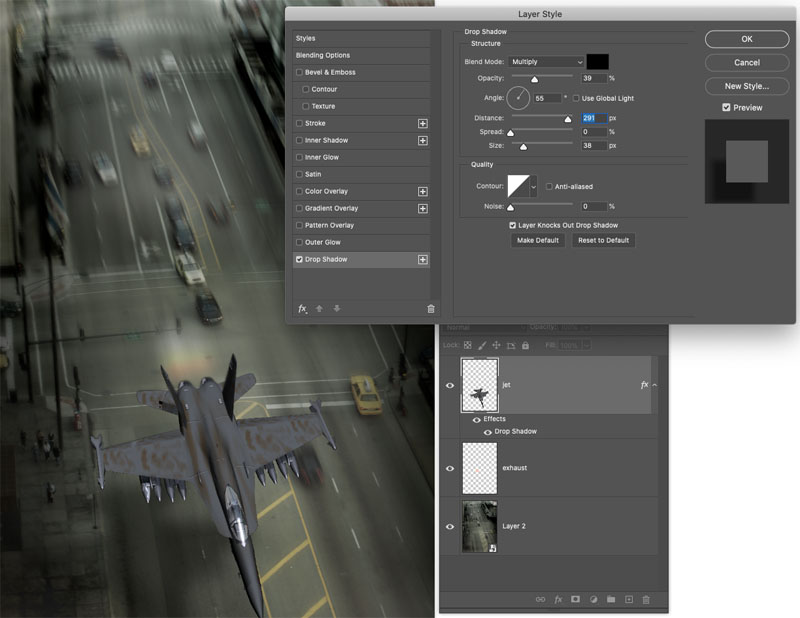This is the beginning file. It contains 3 layers. A background, a jet and the flame for the afterburner, called exhaust.
We are going to animate the jet from the top of the screen to the bottom. We want to turn off the afterburner, then 1/2 way through, we will turn on the afterburner and the jet will speed up. This challenge should be enough for you to learn a lot of the animation tools in Photoshop.
If you need more preceise details on any of the steps, please watch the video. You should watch it anyway to see the animation.

Step 1.
Open the timeline Window>Timeline
Drag the layers to make them longer, we are dragging them out to the 5 second mark.

Step 2.
With both the Jet and exhaust layers selected, drag to the top of the screen and just off the screen as the starting point for the animation.

Step 3.
Select the jet layer. We will animate this first.

Keyframes are how Photoshop does animations. a/ You set the first keyframe. b/ Move the playhead to a different point in time. c/ Change the object on screen. Photoshop will animate the changes over time, lets see…
Step 4. Using keyframes
Click the arrow to reveal the keyframes
Click on the stopwatch by Position to set the start point for the jet

Step 5.
Move the playhead to the end of the timeline. This is where you want the animation to end.

Step 6.
Drag the jet to the ending position.

A keyframe will be generated at the playhead at the end of the timeline.

Step 7.
Press the spacebar of the play button in the timeline to preview the animation. The jet should be moving at a constant speed.

Step 8.
We want to also animate the flame behind the jet.
Move the playhead to the start position.
Choose the exhaust layer and click on the stopwatch for position.

Step 9.
Move the playhead to the end of the timeline.

Step 10.
Drag the exhaust into position.

Play it back and now the jet and the flame should be moving together,


Step 11. Changing the speed of animations in Photoshop
Now we are going to change the speed. We want the jet to start off slowly and then speed up at the end.
Move the playhead to the middle of the timeline (around 2.5 seconds).
Click on the diamond between the 2 arrows to the left of the position stopwatch, this adds a keyframe

Step 12
Click on the exhaust layer
Click the diamond to add a keyframe on the exhaust layer

Step 13
Click one of the keyframes to select it.
Hold down shift and click the second keyframe to also select it.

Step 14
Drag the keyframe to the right. They will both move together because they are both selected.

If you playback now, the jet will move slowly, when it hits the second keyframe it will speed up. (It’s explained on the video why it does this)

Step 15.
Now, we want the flame to only appear when the jet speeds up, as the afterburner kicks in.
Move the playhead back a single frame.

Step 16
In the exhaust layer, turn on the stopwatch for opacity

Step 17.
Turn the opacity to 0 on the exhaust layer

Step 18
Move the keyframe forward 1 frame.

Step 19
Set the opacity to 100

Now the flame will be hidden at the beginning of the animation

When it reaches the keyframes and the jet accelerates, the flame will turn on.

Step 20. Adding a moving shadow
Now we need to add a shadow for realism and depth.
Choose the jet layer
Click the add a layer style button and choose drop shadow

Step 21
Add the setting as shown here

The shadow will move with the jet
Step 22. Changing the shadow over time
Let’s change the shadow so that it looks like the jet is climbing when the afterburner is on.
Move the playhead forward to when the afterburner comes on. (where the speed changes)
On the jet layer, click the stopwatch to add a keyframe for style.

Step 23
Move the playhead forward a little bit.

Step 24
Double click the drop shadow effects to open the effects.
Change the settings as shown here. Make the shadow softer and more transparent. Drag the shadow further away from the jet. (This makes it look like its getting further away.)

Now when you play it back, the yet will move and the shadow will change over time

This makes it look like the jet is climbing. A little bit can go a long way with animation.

I hope you have enjoyed this tutorial on animation in Photoshop.
If you want to learn more about animation and working with video in Photoshop, check out the 2 premium courses I have. (They both work on CS6/CC/2020)
The post How to Animate in Photoshop, Video animation appeared first on PhotoshopCAFE.



